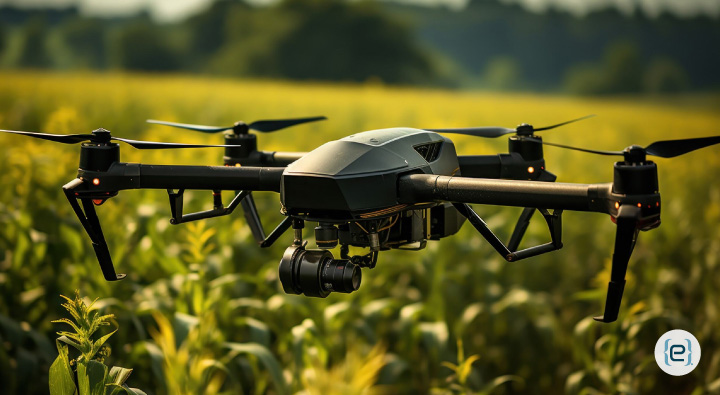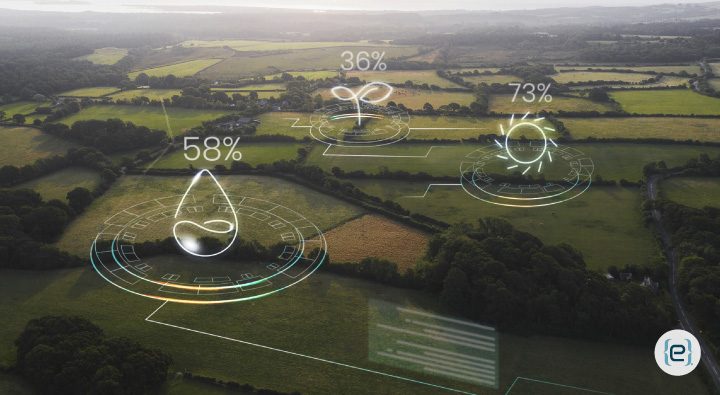AI in Agriculture: Cultivating a Smarter Future for Farming
Farming is changing fast. AI is making a big splash in fields and barns across the world. From smart tractors to robot fruit pickers, tech is transforming how we grow food.
The AI in agriculture market is set to nearly triple from $1.7 billion in 2023 to $4.7 billion by 2028. This growth shows how important these new tools are becoming for farmers. AI helps with many jobs, like checking soil, finding plant diseases, and keeping animals healthy.
These high-tech helpers are good news for farmers and eaters alike. They can boost crop yields, cut down on waste, and make farming kinder to the planet. It’s not all smooth sailing though – there are still some bumps in the road as farms adapt to this brave new world. But one thing’s for sure: the future of farming is looking mighty smart!
Basics of AI in Agriculture
AI is transforming farming with smart technologies and data-driven insights. It helps farmers make better decisions and boost crop yields.
Understanding Artificial Intelligence: AI uses computer systems to do tasks that normally need human smarts. In farming, AI can process lots of data to spot patterns and make choices. It learns from past info to get better over time.
AI in agriculture often uses machine learning. This lets computers find trends in big datasets without being told what to look for. It can help predict crop yields or pest outbreaks.
Another key part is computer vision. This lets AI “see” and analyze images. It can spot plant diseases or count fruits on trees.
The Role of AI in Modern Farming
AI is changing how farms work. It helps with many jobs, from planting to harvesting.
Precision Farming: AI can tell farmers exactly where to put seeds, water, and fertilizer. This saves money and helps the environment.
AI also watches crops as they grow. Special cameras on drones or satellites take pictures. AI looks at these to spot problems early.
Robots are joining farm teams too. They can pick fruit, pull weeds, or milk cows. This helps when there aren’t enough workers.
AI even helps predict the weather. It uses tons of data to make super-precise forecasts. This lets farmers plan better.
AI-Driven Agricultural Technologies
AI is changing farming in big ways. New tools help farmers work smarter and grow more food. Let’s look at some cool tech that’s making farms better.
Precision Agriculture: Precision farming uses AI to watch crops closely. Special sensors check soil, weather, and plant health. This helps farmers know exactly what their fields need.
AI looks at all this data and gives advice. It tells farmers where to put seeds, water, and fertilizer. This saves money and helps the environment.
Farmers can use apps on their phones to see field maps. The maps show which areas need more care. This lets farmers fix problems fast before they get worse.
Drone Technology: Drones with AI are like flying helpers for farms. They zip over fields taking pictures and videos. These images show how crops are doing.
AI checks the drone pictures for sick plants or dry spots. It can count plants and guess how much food will grow. This helps farmers plan better.
Some drones even spray crops. They use AI to spray only where it’s needed. This uses less chemicals and is better for nature.
Automated Irrigation Systems: Smart watering systems use AI to give plants just the right amount of water. They check soil moisture and weather forecasts.
AI learns the best times to water. It turns sprinklers on and off by itself. This saves water and keeps plants happy.
These systems can spot leaks fast. They tell farmers if something’s wrong. This stops water waste and saves money on bills.

Robotics and Crop Management
Farm robots are getting smarter with AI. They can pick fruits and veggies without hurting them. Some even pull weeds!
AI helps robots move around fields safely. They dodge obstacles and work next to people without problems.
Smart tractors use AI to drive themselves. They plant seeds in perfect rows. This makes planting faster and more exact.
AI-powered robots can check crop health up close. They spot bugs or diseases early. This helps stop problems before they spread to whole fields.
Data Management and Analytics
AI is revolutionizing how farms handle information. Smart systems crunch huge amounts of data to help you make better choices. Let’s look at two key areas where this is happening.
Big Data in Agriculture: Farms generate tons of data these days. Sensors in fields track soil moisture, weather stations monitor conditions, and drones snap aerial images. All this info helps you see what’s really going on.
AI steps in to make sense of it all. Machine learning algorithms spot patterns humans might miss. They can predict crop yields or flag potential problems early.
Some cool examples:
- Soil sensors + AI = perfect fertilizer amounts
- Satellite images + AI = early pest detection
- Years of harvest data + AI = optimized planting schedules
Big data is a game-changer. It turns farms into high-tech operations.
Predictive Analytics: Crystal balls don’t work in farming, but AI comes close! Predictive analytics uses past data to guess what might happen next.
For crops, this means:
- Figuring out the best time to plant
- Knowing when diseases might strike
- Estimating how much you’ll harvest
But it’s not just about plants. AI predicts market prices too. You can decide when to sell for maximum profit.
Weather forecasting gets a boost from AI. It helps plan irrigation and protects crops from surprise storms.
The best part? As more data rolls in, predictions get even better. It’s like the farm learns along with you.
Sustainability and Challenges
AI in agriculture brings both exciting possibilities and important concerns. It has the potential to make farming more sustainable, but also raises economic and ethical questions that need careful thought.
Reducing Environmental Impact: AI helps you use fewer harmful chemicals. Smart sensors and drones can spot pest problems early. This means less pesticide use overall. AI-powered irrigation systems save water by giving plants only what they need. Precision farming guided by AI cuts down on fertilizer waste too.
Robots and automated equipment reduce soil damage from heavy machines. They can plant seeds and harvest crops with less soil compaction. This keeps farmland healthier over time.
AI weather forecasts let you time your planting and harvesting better. This cuts fuel use and greenhouse gas emissions from farm equipment. It also helps crops grow with less water and fertilizer.
Economic Considerations: The costs of AI farm tech can be high at first. Small farms may struggle to afford fancy robots and sensors. But prices are coming down as the tech improves. Shared equipment and pay-per-use models could help more farmers access AI tools.
AI can boost crop yields and cut costs in the long run. Smart systems help you use less water, fuel, and chemicals. This saves money over time. AI crop forecasts also help you get better prices for your harvests.
There’s a worry that AI might replace farm workers. But new jobs are popping up too. People are needed to run and fix high-tech farm gear. AI is creating roles for data experts and tech-savvy farm managers.
Ethical Implications: AI in farming raises some tricky questions. Who owns the data collected on farms? Big tech companies? You? There are worries about privacy and data security.
There’s also the issue of AI decision-making. Should a computer decide when to water crops or apply pesticides? What if it makes a mistake? You may lose some control over your land and methods.
AI could widen the gap between big industrial farms and small family operations. Those who can afford the latest tech might have a big advantage. This could change rural communities and traditions.
Lastly, there are concerns about AI’s impact on biodiversity. Super-efficient farming might lead to less varied crops and wildlife. Balancing productivity with ecological health is a key challenge.
As AI continues to evolve, it offers immense potential to make farming smarter and more sustainable. To explore how eMazzanti can help your business harness the power of AI, contact us today.







